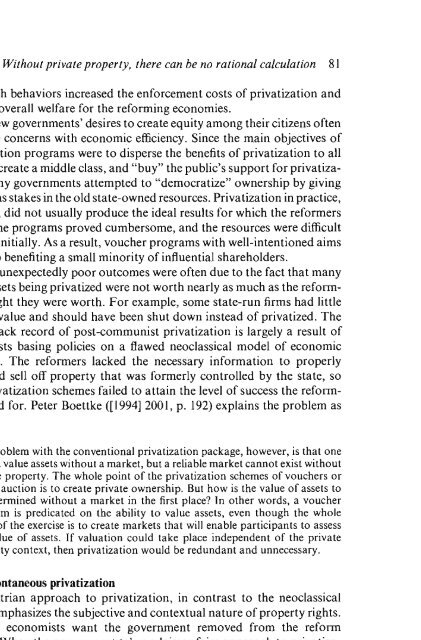Handbook on Contemporary Austrian Economics
Handbook on Contemporary Austrian Economics
Handbook on Contemporary Austrian Economics
Create successful ePaper yourself
Turn your PDF publications into a flip-book with our unique Google optimized e-Paper software.
Without private property, there can be no rati<strong>on</strong>al calculati<strong>on</strong> 81<br />
over; such behaviors increased the enforcement costs of privatizati<strong>on</strong> and<br />
lowered overall welfare for the reforming ec<strong>on</strong>omies.<br />
The new governments' desires to create equity am<strong>on</strong>g their citizens often<br />
overrode c<strong>on</strong>cerns with ec<strong>on</strong>omic efficiency. Since the main objectives of<br />
privatizati<strong>on</strong> programs were to disperse the benefits of privatizati<strong>on</strong> to all<br />
citizens, create a middle class, and "buy" the public's support for privatizati<strong>on</strong>,<br />
many governments attempted to "democratize" ownership by giving<br />
all citizens stakes in the old state-owned resources. Privatizati<strong>on</strong> in practice,<br />
however, did not usually produce the ideal results for which the reformers<br />
hoped; the programs proved cumbersome, and the resources were difficult<br />
to value initially. As a result, voucher programs with well-intenti<strong>on</strong>ed aims<br />
ended up benefiting a small minority of influential shareholders.<br />
These unexpectedly poor outcomes were often due to the fact that many<br />
of the assets being privatized were not worth nearly as much as the reformers<br />
thought they were worth. For example, some state-run firms had little<br />
positive value and should have been shut down instead of privatized. The<br />
mixed track record of post-communist privatizati<strong>on</strong> is largely a result of<br />
ec<strong>on</strong>omists basing policies <strong>on</strong> a flawed neoclassical model of ec<strong>on</strong>omic<br />
behavior. The reformers lacked the necessary informati<strong>on</strong> to properly<br />
value and sell off property that was formerly c<strong>on</strong>trolled by the state, so<br />
their privatizati<strong>on</strong> schemes failed to attain the level of success the reformers<br />
hoped for. Peter Boettke ([1994] 2001 , p. 192) explains the problem as<br />
follows:<br />
The problem with the c<strong>on</strong>venti<strong>on</strong>al privatizati<strong>on</strong> package, however, is that <strong>on</strong>e<br />
cannot value assets without a market, but a reliable market cannot exist without<br />
private property. The whole point of the privatizati<strong>on</strong> schemes of vouchers or<br />
public aucti<strong>on</strong> is to create private ownership. But how is the value of assets to<br />
be determined without a market in the first place In other words, a voucher<br />
program is predicated <strong>on</strong> the ability to value assets, even though the whole<br />
point of the exercise is to create markets that will enable participants to assess<br />
the value of assets. If valuati<strong>on</strong> could take place independent of the private<br />
property c<strong>on</strong>text, then privatizati<strong>on</strong> would be redundant and unnecessary.<br />
6.3 Sp<strong>on</strong>taneous privatizati<strong>on</strong><br />
The <strong>Austrian</strong> approach to privatizati<strong>on</strong>, in c<strong>on</strong>trast to the neoclassical<br />
model, emphasizes the subjective and c<strong>on</strong>textual nature of property rights.<br />
<strong>Austrian</strong> ec<strong>on</strong>omists want the government removed from the reform<br />
process. When the government takes a laissez faire approach to privatizati<strong>on</strong>,<br />
each industry can find its own way towards the market, free from<br />
central directi<strong>on</strong>. In many industries, the de facto owners become the<br />
new stakeholders. While sp<strong>on</strong>taneous privatizati<strong>on</strong> might create inherent<br />
biases, it does a better job of putting local knowledge to work because the

















